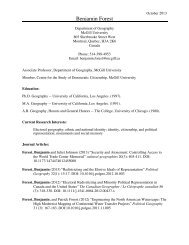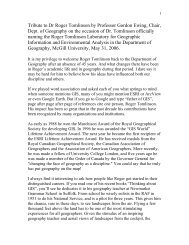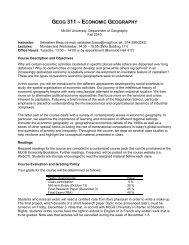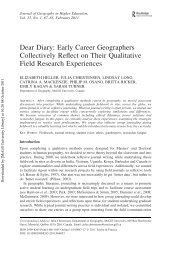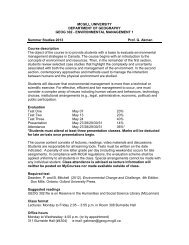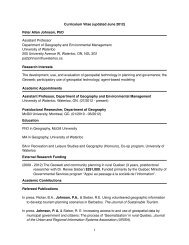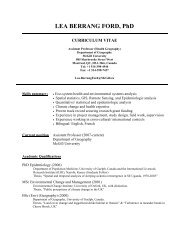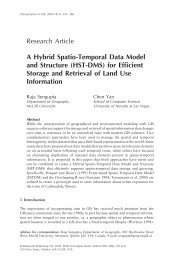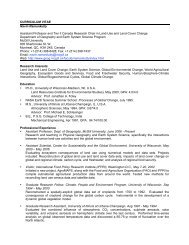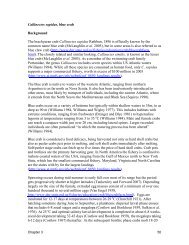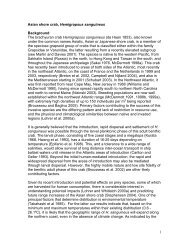Past, Present and Future WF 16:00-17:30 Winter 2012 Instru
Past, Present and Future WF 16:00-17:30 Winter 2012 Instru
Past, Present and Future WF 16:00-17:30 Winter 2012 Instru
You also want an ePaper? Increase the reach of your titles
YUMPU automatically turns print PDFs into web optimized ePapers that Google loves.
McGill University Department of Geography<br />
GEOG 205 – Global Change: <strong>Past</strong>, <strong>Present</strong> <strong>and</strong> <strong>Future</strong> <strong>WF</strong> <strong>16</strong>:<strong>00</strong>-<strong>17</strong>:<strong>30</strong> <strong>Winter</strong> <strong>2012</strong><br />
<strong>Instru</strong>ctors<br />
Dr. Benjamin Heumann<br />
Karen Paquin, MSc.<br />
benjamin.heumann@mail.mcgill.ca<br />
icegrammar@hotmail.com<br />
Teaching Assistant: Drew Pinsonneault tageog205@hotmail.com<br />
Office hours for instructors are by appointment only. Please email us to arrange a time. TA<br />
office hours will be set up around assignments <strong>and</strong> exams.<br />
Course Description<br />
This course examines the changes that have occurred in the global environment through the last<br />
two million years (Quaternary) to the present day, <strong>and</strong> the possible changes in this century<br />
associated with the greenhouse effect, climate change <strong>and</strong> l<strong>and</strong> use change. The course has three<br />
time components:<br />
1. <strong>Past</strong> climate <strong>and</strong> environmental change – includes changes during <strong>and</strong> as a result of the last Ice<br />
Age, an exploration of the way Ice Age theory developed <strong>and</strong> the methods researchers use to<br />
study climate <strong>and</strong> environmental changes, <strong>and</strong> an investigation of the Little Ice Age<br />
2. <strong>Present</strong> day climate <strong>and</strong> environmental change – how the present-day patterns of climate <strong>and</strong><br />
vegetation are generated <strong>and</strong> distributed, l<strong>and</strong> use <strong>and</strong> l<strong>and</strong> us changes, <strong>and</strong> an introduction to<br />
Earth’s systems<br />
3. <strong>Future</strong> climate <strong>and</strong> environmental change – predictions of what future climate <strong>and</strong> l<strong>and</strong>scapes<br />
will look like, insight into the causes for these climatic <strong>and</strong> environmental changes; <strong>and</strong><br />
challenges <strong>and</strong> possible solutions.<br />
Required Reading<br />
Imbrie J, <strong>and</strong> Imbrie KP, (1979). Ice ages: Solving the Mystery, Harvard University Press,<br />
Cambridge MA. – Available in the bookstore <strong>and</strong> on reserve in the library.<br />
Additional weekly required readings will be made available on WebCT.<br />
Course Evaluation<br />
You will be expected to take notes in this class. Your grade for the course will be based on the<br />
following items:<br />
Midterm exam 35%<br />
Two class assignments 20% (10% each)<br />
Final exam<br />
45% (cumulative, but weighted toward post-midterm material)
McGill University Department of Geography<br />
GEOG 205 – Global Change: <strong>Past</strong>, <strong>Present</strong> <strong>and</strong> <strong>Future</strong> <strong>WF</strong> <strong>16</strong>:<strong>00</strong>-<strong>17</strong>:<strong>30</strong> <strong>Winter</strong> <strong>2012</strong><br />
Unless you have received permission to miss an assignment deadline (e.g. medical excuse), all<br />
assignments are due at the end of class on the day stated on the assignment. You cannot email<br />
assignments. 25% will be deducted from your grade for each day an assignment is late.<br />
If you miss the mid-term, you must have a valid reason, such as a medical emergency (for which<br />
a doctor’s note is required) or a family crisis. If you miss this exam, please contact an instructor<br />
or TA as soon as possible. If you have a valid reason with valid documentation, we will arrange<br />
a make-up exam for you. We cannot provide make-up opportunities for the final exam; this is<br />
arranged by the university.<br />
Schedule Conflicts<br />
In the past, some students have signed up for this class in parallel with another class or lab <strong>and</strong><br />
missed most lectures. This is illegal. Please do not use this excuse. We expect you to attend all<br />
classes <strong>and</strong>, if you miss a class, make arrangements to catch up on assignments <strong>and</strong> find out<br />
about other course material <strong>and</strong> announcements.<br />
Class Etiquette<br />
Please be respectful of the instructors <strong>and</strong> other students. We request that you refrain from<br />
talking, sleeping, or focusing on non-course materials (e.g. social media) during class <strong>and</strong> that<br />
you give your full attention to the professors, guest lecturers, or videos. While the readings <strong>and</strong><br />
lecture slides compliment the lectures, the content of the lectures themselves is unique <strong>and</strong> will<br />
require note taking in class. If you must leave class early, please try to sit near the door so as not<br />
to disrupt your fellow students when you depart. If you arrive late, please enter from the back of<br />
the class.<br />
McGill University values academic integrity. Therefore, all students must underst<strong>and</strong> the<br />
meaning <strong>and</strong> consequences of cheating, plagiarism <strong>and</strong> other academic offenses under the Code<br />
of Student Conduct <strong>and</strong> Disciplinary Procedures (see www.mcgill.ca/students/srr/honest/) for<br />
more information.<br />
Although you may discuss your assignment questions, preparation of answers must be an<br />
individual effort. Your written material must be your own <strong>and</strong> unique.<br />
In accordance with McGill University’s charter of Student Rights, students in their course have<br />
the right to submit in English or French any written work that is to be graded.
McGill University Department of Geography<br />
GEOG 205 – Global Change: <strong>Past</strong>, <strong>Present</strong> <strong>and</strong> <strong>Future</strong> <strong>WF</strong> <strong>16</strong>:<strong>00</strong>-<strong>17</strong>:<strong>30</strong> <strong>Winter</strong> <strong>2012</strong><br />
Class Schedule<br />
Date Topic (Readings <strong>and</strong> Assignments) <strong>Instru</strong>ctor<br />
Jan. 11 Introduction to class (Imbrie <strong>and</strong> Imbrie ch. 1-2, IPCC FAQ)<br />
Heumann<br />
<strong>and</strong> Paquin<br />
Jan. 13 Earth systems - part 1 (Imbrie <strong>and</strong> Imbrie ch. 3-4) Heumann<br />
Jan. 18 Earth systems - part 2 (IPCC Ch. 2; Imbrie <strong>and</strong> Imbrie ch. 5-6) Heumann<br />
Jan. 20 Causes of Climate Change (Imbrie <strong>and</strong> Imbrie ch. 7-8) Heumann<br />
Jan. 25 Ice Age Theory: the players <strong>and</strong> the proof 1 (Imbrie <strong>and</strong> Imbrie ch. 9-10) Paquin<br />
Jan. 27<br />
Ice Age Theory: the players <strong>and</strong> the proof 2<br />
(Imbrie <strong>and</strong> Imbrie ch. 11-12) (Assignment 1 h<strong>and</strong>ed out)<br />
Paquin<br />
Feb. 1<br />
Climate <strong>and</strong> Environmental Change due to the Ice Age<br />
(Imbrie <strong>and</strong> Imbrie ch. 13-14)<br />
Paquin<br />
Feb. 3 Humans on the Move (Imbrie <strong>and</strong> Imbrie ch. 15-<strong>16</strong>) Paquin<br />
Feb. 8 Medieval Climatic Optimum (Imbrie <strong>and</strong> Imbrie readings completed) Paquin<br />
Feb. 10 Film: Little Ice Age : The Big Chill Paquin<br />
Feb. 15 The Little Ice Age: regional examples 1 Paquin<br />
Feb. <strong>17</strong> The Little Ice Age: regional examples 2 (Assignment 1 DUE) Paquin<br />
Feb. 22<br />
Reading week<br />
Feb. 24<br />
Reading week<br />
Feb. 29 Research methods: how we study climate/env. change Paquin<br />
Mar. 2 MIDTERM EXAM Paquin<br />
Mar. 7 Summary of <strong>Past</strong> Climate <strong>and</strong> Environmental Change Paquin<br />
Mar. 9 The Onset of the Industrial Revolution Paquin<br />
Mar. 14 Climate Models <strong>and</strong> Biosphere (Assignment 2 h<strong>and</strong>ed out) Heumann<br />
Mar. <strong>16</strong> Humans <strong>and</strong> Climate Change pt.1 Heumann<br />
Mar. 21 Humans <strong>and</strong> Climate Change pt. 2 Heumann<br />
Mar. 23 Impacts on Ecosystems Heumann<br />
Mar. 28 L<strong>and</strong> use <strong>and</strong> water (Assignment 2 DUE) Heumann<br />
Mar. <strong>30</strong> Climate Solutions Heumann<br />
Apr. 4 Climate Modeling – Guest Lecture Heumann<br />
Apr. 11 Film – Earth: An Operators Manual Heumann<br />
Apr. 13<br />
Summary <strong>and</strong> Exam Review<br />
Heumann /<br />
Paquin<br />
Deadline for course changes is January 24, <strong>2012</strong>.<br />
Final exam: Heumann <strong>and</strong> Paquin



